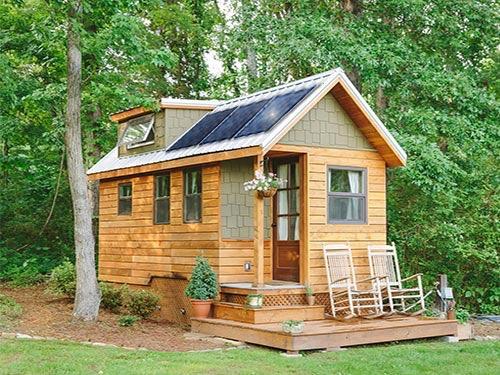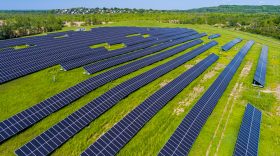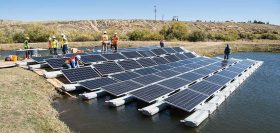2016 is bringing us a flood of new products targeting toward the upcoming boom in battery-based solar.
The heyday of indie grid-tied solar is coming to an end. We have reached “peak rooftop” when it comes to utility interconnected systems. The utility companies point to grid constraints or hidden costs to consumers as reasons to drop the boom on net metering, and many utilities across the country are now trying to slam the door on true distributed generation.The smoldering utility fears, real or imagined, are fanned into flame by groups like ALEC who are fighting a state-by-state war against indie solar. The consequences of their actions may be more than they bargained for, though. Battery prices are dropping fast, and soon, customers will be cutting the cord on their utilities with the help of a new wave of off-grid products.
Last year, Elon Musk made a splash with the release of the Tesla Powerwall. Despite all of the excitement about the electric car company moving into the stationary battery market, Tesla is far from the only company looking to a solar with storage future. Let’s look at a few of the other companies tooling up to serve the off-grid market.
German battery innovator Sonnen has introduced its new “eco compact”, a streamlined, all-in-one energy storage solution retailing at 40% below the cost of its current residential units.
Admittedly, the eco compact is not a truly off-grid product. Sonnen was able to cut the cost by removing the backup power features. Using Sonnen’s self-learning software, the eco compact provides various grid-tied functions, such as increasing household solar self-consumption, managing time-of-use and supporting grid services, not including backup power. The 4 kWh system retails for $5,950 without installation for a fully integrated system including the inverter, the battery modules with a 10,000 cycle lifetime, the smart energy manager and the measurement technology. Furthermore, the company notes the modular design also allows the product to be expanded in 4 kWh increments up to 16 kWh in a single compact unit.
“We’ve seen increasing demand from our installation partners for a lower-cost energy storage product that enables homeowners to use more of the power generated by rooftop solar systems,” says Boris von Bormann, CEO of sonnen Inc. “With the sonnenBatterie eco compact, we are providing a simple, cost-effective version of our proven energy management technology that enables more solar-powered homeowners to supply up to 100 percent of their own power needs. As a result, we expect to see a dramatic increase in the installation of storage across the country.”

CyboEnergy Releases On/Off-Grid CyboInverter For PV Water Heating
CyboEnergy, Inc. (Rancho Cordova, CA), the developer of the world’s first solar power Mini-Inverter that possesses the key merits of both central inverters and microinverters, announced today that the company has released a Dual-Output Off-Grid CyboInverter that can run two distinct types of AC loads such as an electric water heater or a refrigerator.
CyboEnergy CEO, Dr. George Cheng said, “With the rapid deployment of renewable energy, the power grid in many areas can no longer take more on-grid solar systems. For instance, Hawaii ended the solar net-metering program in 2015. In April 2016, ISO (Independent System Operator) in California forced temporary shutdown of large solar farms to avoid grid instability. For this reason, off-grid solar heating and cooling has a great potential in the U.S. and European market.”

Iron Edison Nickel-Iron Batteries
The Iron Edison Lithium Iron battery is designed and assembled at the company’s headquarters located just outside Denver, Colorado. The Lithium Iron battery is available in standard 12 Volt, 24 Volt and 48 Volt configurations. Capacities range from 2 kWh to 42 kWh, with custom high-capacity and high-voltage models available for commercial applications like peak load shaving and UPS.
According to the manufacturer, The Iron Edison Lithium Iron battery is an ideal replacement for lead-acid battery, with longer cycle life, smaller footprint, and maintenance-free operation. Residential applications include solar battery backup, grid-zero and off-grid energy storage. Commercial applications include high voltage battery backup, off-grid telecommunications power and peak load shaving.
“The Lithium Iron battery is the next step in energy storage,” Williams said. “It offers extremely high power in a very small package. The maintenance-free operation of the Lithium Iron battery is a great fit for everyday homeowners. We are offering cutting-edge battery technology in a package that’s easy to install and operate.”
Outback Skybox
Renewable energy systems and products manufacturer Outback Power has introduced the Skybox, a hybrid energy management and storage platform, which will be scheduled for release in January 2016.
The all-in-one box allows PV systems and batteries to interact with the grid to manage self-consumption. The company touted the product as a way to reduce grid reliance. Skybox will integrate directly with the electrical grid and future high-voltage storage solutions, giving customers complete control of their energy consumption and usage. The new system is optimised to work with new and existing commercial and residential installations.
The Skybox is designed for compatibility with storage solutions between 300 and 500 volts from Tesla, Mercedes-Benz, Panasonic and others.
Drew Zogby, president of Alpha Technologies, OutBack’s parent company, said: “This new platform from OutBack Power gives people total control of energy management and power consumption in their homes and businesses. People are growing more aware of the options available to them, and true hybrid energy systems are the future. Skybox will allow energy use to be as intelligent and efficient as possible.”
While American solar installers tool up to meet the upcoming demand for off-grid or behind the meter storage, SA power in Australia is starting a pilot program that will be Australia’s “largest trial of combined solar and energy storage in an established suburb” in Salisbury, with 100 of its eligible customers getting access to subsidized battery storage systems, along with solar arrays (if not already installed). The company is offering the trial to customers living on “particular streets” in certain suburbs of Salisbury, with “significant financial assistance” available for the purchase of the batteries and solar panels, and a guarantee of saving a minimum of $500 per year on their electric bill.






